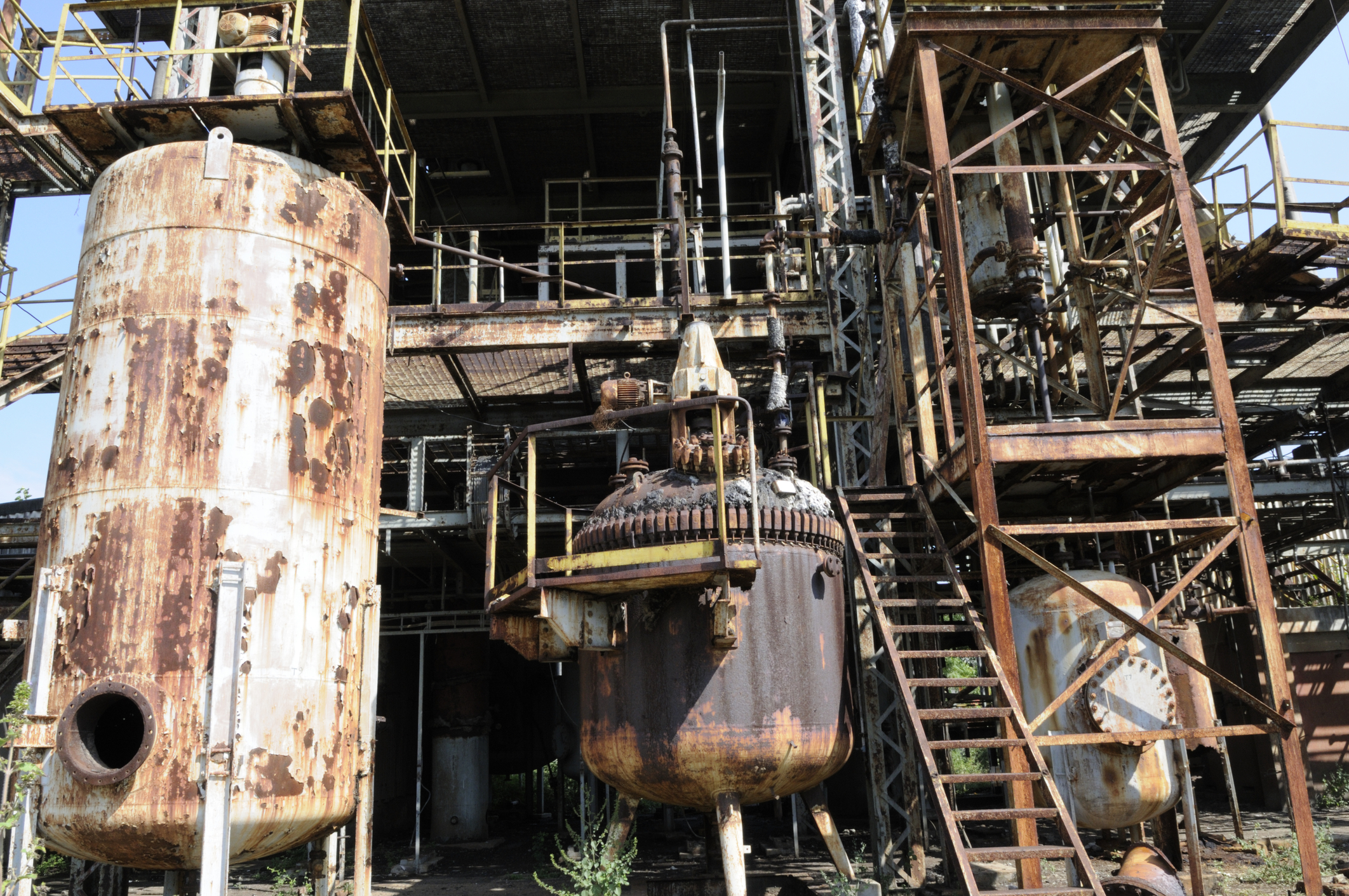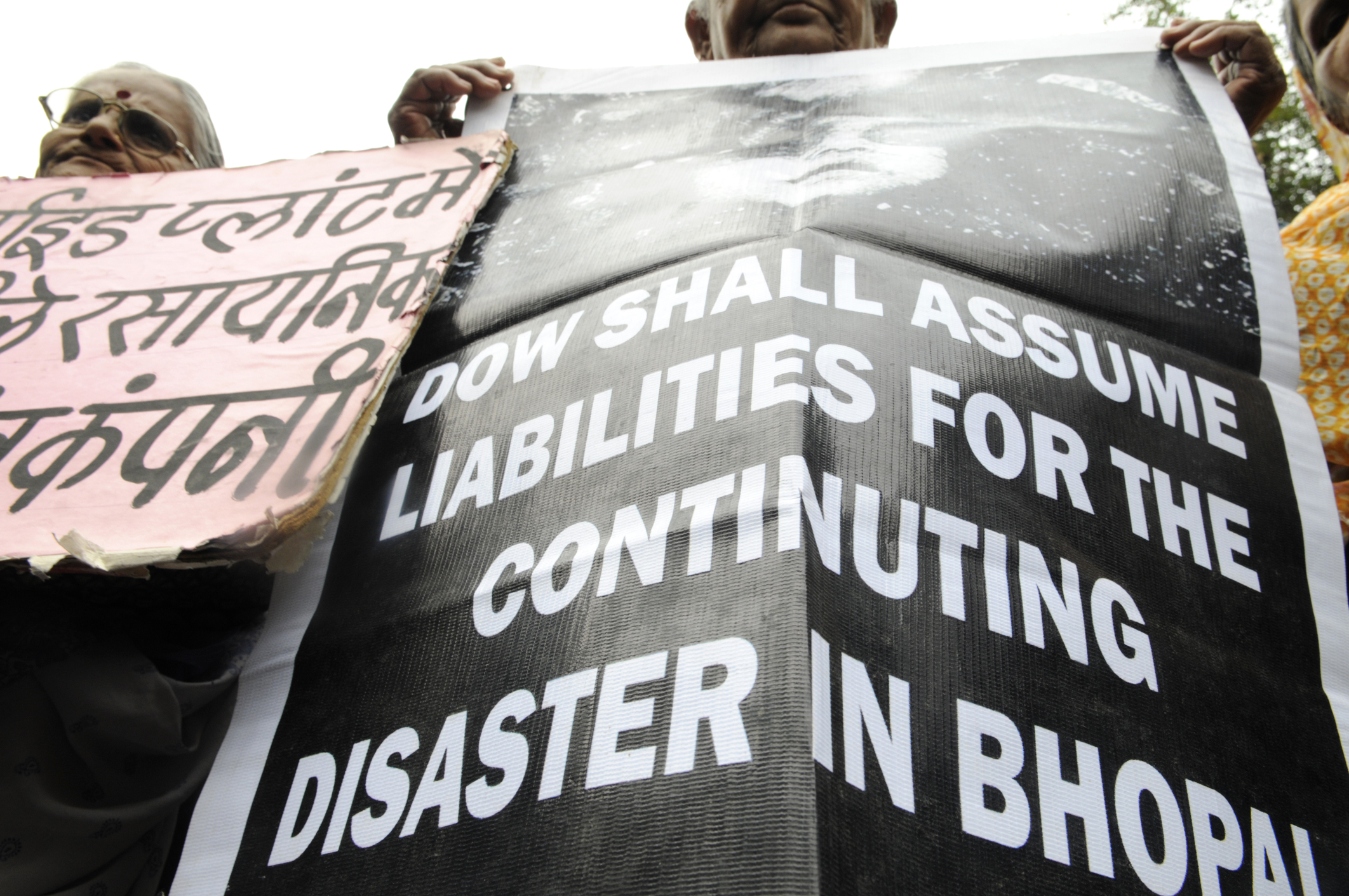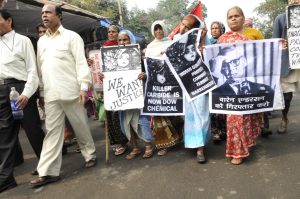Balkrishna Namdev, a 71-year-old social activist and trade union organizer from central India’s Bhopal city, spoke slowly and calmly but with deep conviction, unwearied by the prolonged struggle for justice he has been part of for the past four decades.
“Corporates prioritize profit over people and the planet. With the profit, they purchase parties and governments. That’s why they are recklessly and shamelessly killing people and the planet, as governments silently watch,” he said, sounding bitter but resolute.
Namdev is president of Bhopal Gas Peedit Nirashrit Pension Bhogi Manch, an organization of the survivors of the Bhopal gas tragedy, the world’s worst industrial disaster. He has been through a hectic schedule over the past few weeks, preparing for the 40th anniversary commemoration of the tragedy that happened in the outskirts of Bhopal.
The leaking of the deadly methyl isocyanate (MIC) gas at the Union Carbide Factory premises was the nightmare of nightmares for its workers and other people living in the vicinity, particularly those in JP Nagar, the nearest neighborhood, where mostly the workers and their families lived. The toxic gas killed thousands on the intervening night of December 2-3, 1984, and many more subsequently, as health tragedies continued to unfold. Bhopal has been called a “health holocaust.”
And the holocaust continues to unfold; the site still hosts 337 tonnes of toxic waste that has not yet been disposed of. This toxic dump has been blamed for health damage due to soil and groundwater contamination in and around the factory site. However, the waste cannot be disposed of, as the people living near every proposed disposal facility – from Gujarat and Maharashtra in India to Hamburg in Germany – have objected to the disposal plan.
The 40th anniversary commemoration started on November 15, 2024, when artists covered the factory’s boundary wall with graffiti evoking the disaster. On November 23, a fortnight-long exhibition of photographs, posters, artworks, and objects related to the tragedy opened in a roadside tent at the JP Nagar Colony, just across from the haunted remains of the Union Carbide factory.
All these activities aimed to remind the world that three things have still not changed – justice eludes, suffering continues, and the toxic waste remains in place. Survivors and advocacy bodies call Bhopal “an ongoing corporate crime.”
The Union Carbide Corporation (UCC), a U.S.-majority company at the time of the disaster, has been a wholly-owned subsidiary of the U.S.-headquartered Dow Chemicals since 2001.
Despite the magnitude of the tragedy and widespread allegations of criminal negligence on the part of the company management, Warren Anderson, the American businessman who was then the UCC CEO, evaded the long arm of the law. His highly placed friends reportedly helped him leave India soon after a warrant was issued for his arrest. He died in the United States in September 2014 without having to ever return to India to appear in court. The United States repeatedly rejected India’s requests for Anderson’s extradition – in 2004, 2005, 2008, and 2010.
Neither have the Indian officials who were pronounced guilty of causing death by negligence in 2010 spent a single day in jail. They received bail on the day of conviction and their appeals are yet to be adjudicated. On November 4 of this year, when Bhopal district judge Manoj Shrivastava started hearing the appeal by the convicted management staff, he was the eighth judge in 14 years to hear the case – all having been transferred before concluding, as the appeal dragged on.
Speaking to The Diplomat, Namdev connected “corporate profit-mongering” with the disaster, highlighting that the tragedy happened due to gross safety lapses caused by the company’s cost-cutting measures. This charge has been repeated over and over in the last 40 years.
Namdev alleged that the same profit-oriented mindset has been driving climatic changes, endangering the planet. Climate change was one of the topics discussed during the protest events in Bhopal on December 2 and 3.
“They have tried to get away with their crime, have been aided by government and politicians in myriad ways and the judiciary was at its best insensitive to the survivors’ interests,” said Namdev.
He added, “We won’t relent. Justice for Bhopal is now a battle for a world safer from corporate crimes.”

The ruins of the Union Carbide Gas Plant, which leaked the deadly gas that killed many in the 1984 disaster in Bhopal, India, as seen on Nov. 17, 2010. (ID 18633591 @ Arindambanerjee | Dreamstime.com)
Toxic Tale
One of the posters at the JP Nagar exhibition highlighted how, even after four decades, there was no clarity on the number of deaths caused by the gas leak. The poster shows that Union Carbide gave a figure of 5,200 deaths, the government of India put the death toll at 5,479, and the government of Madhya Pradesh, the central Indian state that is home to Bhopal, gave a figure of 15,342. In contrast, survivors’ organizations put the figure at 19,417 up until 2009.
The poster called the Indian government’s figure “incredible,” highlighting how the government itself put the number of women widowed by the disaster at 5,530. Currently, they place the figure at 23,000, as another poster showed.
The figure keeps increasing as survivors allege that many have been inflicted with long-term ailments, including both the direct survivors and many of their children. The contamination of soil and groundwater added to the health woes. People routinely spend hours in hospital queues. Complications include congenital malformations, growth retardation, and immune system damage in the children of gas-exposed parents.
At a Harvard T. H. Chan School of Public Health event in September, Farhat Jahan, who was five months old at the time of the tragedy, narrated how her mother got pulmonary fibrosis. One of her elder sisters had chronic renal failure and is on dialysis several times each week, while another sister died of renal failure when she was 24, leaving behind two daughters, one of whom was born with severe birth defects.
Amid all the sufferings, what pains the survivors the most is that the culprits “got away” with only having to pay “meager financial compensation.”
The $470 million compensation that the UCC paid the Indian government has long remained a matter of controversy. According to a New York Times report from 1989, “The settlement will have only a small financial impact on Carbide.” In a 2005 paper, Edward Broughton of New York’s Columbia University’s Mailman School of Public Health called the compensation amount “a relatively small amount based on significant underestimations of the long-term health consequences of exposure and the number of people exposed.”
In 2022, U.K. Labour Party parliamentarian Navendu Mishra told Parliament during a debate that “the $470 million agreed resulted in 93 percent of claimants being awarded the equivalent of £380 ($484) each for what, in reality, are life-changing injuries.”
It has been alleged that India’s then Prime Minister Rajiv Gandhi took a soft stance against the UCC to “protect his economic modernization program,” fearing that tough measures could hurt India’s desire to present itself as “a corporate and investment-friendly market.”
While the survivors continue to pursue different legal and political options in their search for greater compensation, their fight has transformed into one for “setting the right kind of precedent.” Not letting big corporations and governments bury the memories and the continually unfolding nature of the disaster is part of the battle. Organizers now describe the Bhopal tragedy as “an anti-racist, feminist, environmental issue.”
In September, a group of Bhopal survivors went on a 17-stop speaking tour across the United States. At an event co-hosted by West Virginia State University, Dow Chemical’s role in “poisoning land and water” in West Virginia was discussed. At Beaver County, they “compared notes on corporate crime in Bhopal, Beaver County, and East Palestine,” the latter a reference to the derailment of a train carrying hazardous materials in Ohio in February 2023. A report on their stop at Philadelphia was headlined “Bhopal: Hiroshima of the chemical industry.”

Victims with a banner ask the U.S. firm Dow Chemical to accept liabilities for the tragedy during a rally on the 26th anniversary of the Bhopal Gas Disaster, in Bhopal, India, on Dec. 2, 2010. (ID 35584670 @ Arindambanerjee | Dreamstime.com)
Realizing Accountability
Union Carbide authorities have tried hard to portray the incident as the result of an act of sabotage by a disgruntled employee, despite an Indian government report ruling this out. Dow has always maintained that it had no liability for what happened in India under UCC’s management. Both see the 1989 compensation “deal” with the Indian government as the full and final settlement of the issue.
However, the survivors’ relentless battle forced the Dow authorities to appear before an Indian court for the first time in 2023. The proceedings are now caught in various appeals over jurisdiction, an issue that UCC raised in different ways after the disaster. Dow Chemicals has since followed suit.
In a list of demands publicized this November as part of the 40th anniversary commemoration, four organizations involving survivors asked for the Indian government’s action to ensure that the prosecution, the Central Bureau of Investigation (CBI), acts tough against both Dow Chemical and its Indian subsidiary in the ongoing legal cases and “goes after” Indian public sector units that continue to sell UCC products.
According to survivors’ organizations, UCC or Dow Chemicals must compensate for the health damages and the Indian government must sue them for the damages to the children of gas-exposed parents based on hospital records and scientific studies. They suggest that the Indian government should seek the United Nations Environment Program’s assistance for a comprehensive scientific assessment of soil and groundwater contamination.
“Bhopal is a classic case of corporates getting away with incorrigible crimes,” said social activist Rachna Dhingra of Bhopal Group for Information and Action, an advocacy group comprising survivors. “The government helped the corporate management and the judiciary allowed their lawyers to pursue delaying tactics. It sets the worst kind of precedent.”
Survivors also demand more government funds to be allocated for the medical, social, economic, and environmental rehabilitation of Bhopal survivors. According to them, all communities within 4.5 kilometers of the abandoned site need clean piped drinking water. They need regular health check-ups and treatment, not only from gas exposure but also from water and soil contamination.
On November 30, 2024, survivors’ organizations moved a fresh petition in an Indian court, seeking additional compensation from the government for survivors with cancers and fatal kidney diseases whose injuries from gas exposure had been wrongfully categorized as temporary.
The activists are also fighting the government’s toxic waste disposal plans. The waste is finally set to be incinerated at a facility at Pithampur in Madhya Pradesh. Survivors’ organizations allege that such a measure “will only expose a very large population to dangerous chemicals.”
They demand that Dow Chemicals clean up the soil and groundwater contaminated by the “reckless dumping of hazardous wastes by its subsidiary, UCC,” and pay for the environmental damage. In so doing, they hope to connect the disaster to to the climate action principle of “polluters pay.”
According to Rasheeda Bee, president of the Bhopal Gas Peedit Mahila Stationery Karmchari Sangathan, another survivors’ body, “At present, Bhopal’s fight is to unite the well-meaning people of the world against corporate crimes to save the planet from their dangerous greed.”
The 68-year-old survivor, who lost six family members to cancer, reflected the spirit of the famous lines from a Dylan Thomas poem: “Do not go gentle into that good night… Rage, rage against the dying of the light.” Some activists have painted the same words on the boundary walls of the haunted factory.

































